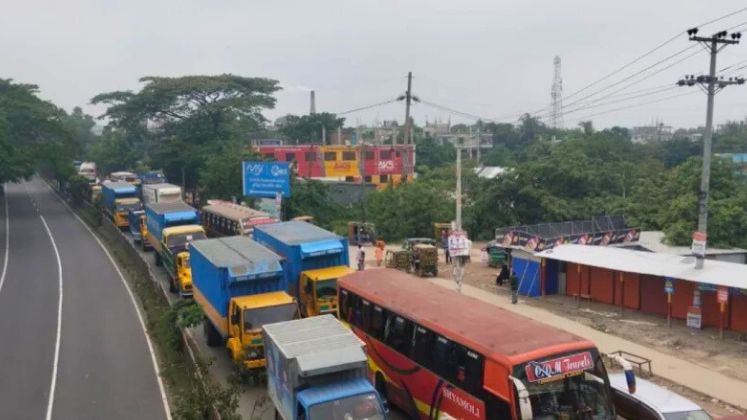
The Dhaka-Chattogram Highway, Bangladesh’s primary trade corridor, is experiencing unprecedented traffic congestion amid a surge in cargo volumes driven by exporters rushing to meet a looming US tariff deadline. The resulting gridlock has caused severe delays, safety hazards, and increased road accidents, raising concerns over infrastructure capacity and logistics management.
Exports at key inland container depots (ICDs) in the port city soared by 150% in July, with some depots experiencing growth rates exceeding 260%. This surge was primarily fueled by exporters rushing shipments ahead of the US tariff implementation on August 1, with industry insiders predicting continued pressure into September, coinciding with Bangladesh’s peak ready-made garment (RMG) export season.
The volume of cargo handled at Chattogram’s ICDs jumped dramatically, with July handling approximately 85,000 TEUs, a significant increase from just over 32,000 TEUs in June. Imports also saw a rise, doubling from 13,000 TEUs to 25,000 TEUs during the same period. Historically, exports have outpaced imports, with the gap widening in recent months, reaching over 70,000 TEUs in some months.
This surge has overwhelmed the existing infrastructure. The ICDs, located along a 30km stretch through Sitakunda, include facilities like KDS Logistics, Port Link, BM Depot, Nemsan, Golden, and ISATL. Many of these depots sit directly adjacent to the highway, causing frequent disruptions as trucks enter and exit, especially during peak periods. During July, some trucks queued for days to gain access, with freight forwarders and shipping lines dispatching up to 700 trucks daily, far exceeding the designed capacity of around 400.
Truck drivers have voiced concerns over inadequate parking facilities at the ICDs, which are exacerbating the chaos. Operators blame poor coordination and the lack of confirmed schedules from exporters for the delays, forcing many trucks to wait outside the depots for days. Depot authorities, meanwhile, acknowledge the parking shortages and have indicated plans to improve coordination, with mobile courts identifying two key issues: parking and unplanned U-turns that further block traffic flow.
Industry leaders emphasise the need for expanded ICD capacity. Bicda Secretary General Ruhul Amin Sikder highlighted that cargo volumes are increasing annually, but infrastructure expansion has lagged, partly due to parking fee caps that discourage investment in land development. Several new ICDs are under construction and expected to commence operations soon, aiming to ease the mounting pressure.
As Bangladesh’s export sector continues to grow, stakeholders stress the urgent need for infrastructural upgrades and better traffic management to prevent further disruptions and safeguard lives on the vital trade route.






